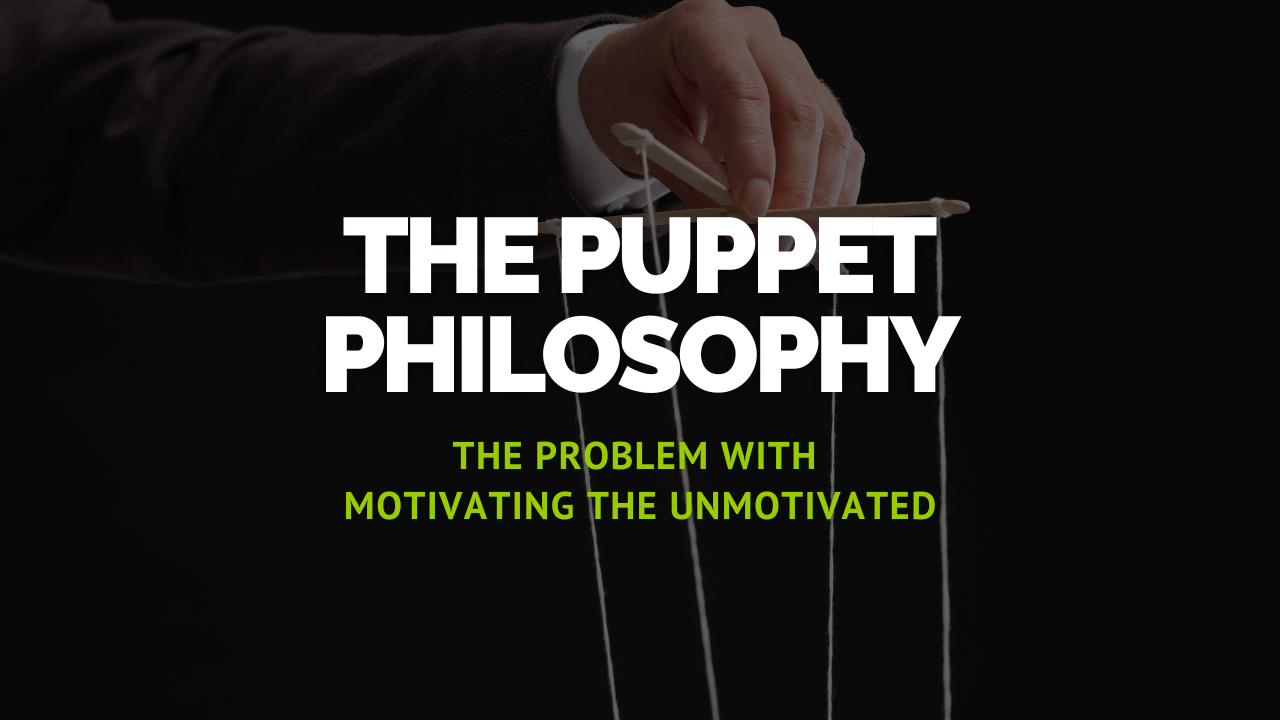The PUPPET Philosophy
May 12, 2025
Written by Carol Quinn
There is a philosophy out there that we can motivate almost anyone to do their job…no matter what that job is. This philosophy specifically refers to people who are unmotivated or undermotivated. It insinuates that employees are like puppets, and we can get them to do or not do whatever we want.
 This Puppet Philosophy suggests we can not only motivate others but also take away their motivation as well. After all, countless employees have blamed their managers for their lackluster gusto to do their jobs. Apparently, we have a lot of power and control over other human beings, especially those we employ. If we have this great power over others, it must be because they don’t have this same power over themselves…right? Essentially, we motivate them to do their job because they cannot motivate themselves. It has an air of superiority, don't you think? Despite this way of thinking being long-withstanding, it has many downsides that are actually counterproductive to motivation and success.
This Puppet Philosophy suggests we can not only motivate others but also take away their motivation as well. After all, countless employees have blamed their managers for their lackluster gusto to do their jobs. Apparently, we have a lot of power and control over other human beings, especially those we employ. If we have this great power over others, it must be because they don’t have this same power over themselves…right? Essentially, we motivate them to do their job because they cannot motivate themselves. It has an air of superiority, don't you think? Despite this way of thinking being long-withstanding, it has many downsides that are actually counterproductive to motivation and success.
Puppet Philosophy Downsides:
- First, it fuels a belief in personal powerlessness and rarely leads anyone to realize their full potential or become a High Performer.
- It causes people to think they can get away with being unmotivated because it often lacks any real consequence. Said another way, employers may not like it, but they tolerate it and even reward it with incentives to get the unmotivated to do their jobs.
- It implies that people can have control over us – meaning they can control you and me.
- It is the ultimate blame game. “I didn’t get good results because my boss inadequately motivated me, so it’s not my fault.” Just thinking about it makes me feel burdened with responsibility for other people’s success or like a victim who was insufficiently motivated to achieve greater success.
Do we really want to take responsibility for motivating someone who is not? Don't we have enough responsibility already? Who will do our job while we're trying to get others to do theirs? Do we truly want to fuel the notion that anyone is powerless or that any human being is controlled by another? Are we really doing anyone a favor? Being unmotivated does not work for us, so why should it be okay for anyone else? It appears that unmotivated and the mediocrity associated with it has become socially acceptable, and even normal, simply because it has been tolerated for so long. Ever wonder what would happen if we just stopped motivating unmotivated people and started holding them accountable for their unacceptable behavior instead?
 The philosophy of motivating the unmotivated has made ‘how we manage’ appear more important than ‘who we hire’. It causes us to focus more on finding the best ways to get people to do their jobs rather than the best ways to identify and hire the best job performer. We tend to think we are already doing a good enough job at selecting the best (aka “self-motivated employees”) when, in reality, we’re not. If we look at the fact that employee engagement is one of the hottest topics in the 21st Century, we realize that there is an epidemic problem regarding mediocre performance. A recent article offering six tips on how to maximize employee productivity listed Step One as “onboarding.” So, you are telling me a bad hire who is onboarded correctly will turn into a Superstar? Or a High Performer onboarded poorly will fail? Nonsense! Onboarding practices do not replace the need for effective hiring practices. The real failure is not connecting the dots between employee performance and interviewer effectiveness… or lack thereof.
The philosophy of motivating the unmotivated has made ‘how we manage’ appear more important than ‘who we hire’. It causes us to focus more on finding the best ways to get people to do their jobs rather than the best ways to identify and hire the best job performer. We tend to think we are already doing a good enough job at selecting the best (aka “self-motivated employees”) when, in reality, we’re not. If we look at the fact that employee engagement is one of the hottest topics in the 21st Century, we realize that there is an epidemic problem regarding mediocre performance. A recent article offering six tips on how to maximize employee productivity listed Step One as “onboarding.” So, you are telling me a bad hire who is onboarded correctly will turn into a Superstar? Or a High Performer onboarded poorly will fail? Nonsense! Onboarding practices do not replace the need for effective hiring practices. The real failure is not connecting the dots between employee performance and interviewer effectiveness… or lack thereof.
STEP ONE for creating a maximum productivity organization is to HIRE highly motivated people. If an organization has a problem with unmotivated employees, Step One is NOT happening. If we’re truly hiring highly motivated, or “self” motivated, people… people who put themselves into motion, are passionately driven to find solutions, overcome obstacles, and achieve goals, we don’t need to motivate them. They are already motivated… self-motivated! Great hires, the people I call “High Performers,” do not need a perfect work environment or perfect onboarding to produce great results. They don’t become less motivated when obstacles appear insurmountable, but instead, they become MORE MOTIVATED. Their motivation does not wax and wane depending on the presence or absence of challenge. They do not whine about what is stopping them or who did not do what. They do not build a case for why it cannot be done. They find a way to work with the budget, people, and resources they have. They turn on their creative, problem-solving brainpower. At least, that is true for the High Performers anyway. It is quite a different story for those who are NOT highly self-motivated. These are the people, on the other hand, who can do a reasonably decent job as long as it’s easy, but as soon as a challenge pops up, personally or professionally, their performance tanks like a rollercoaster going downhill. Now, your job is to try to motivate them and get someone to pick up their slack. Let’s be clear: these aren’t the High Performers, despite doing well on good days—so don't call them that. If organizational success was truly about motivating employees, why do only some employees need to be motivated... and not everyone? And why do we need to keep motivating the same people repeatedly if motivating them is so effective? These are good questions to ponder. New light is being shed on the ‘motivate the unmotivated’ strategy for success. The management philosophy that employees are like puppets and can be demotivated and re-motivated is failing to create high-performing organizations, and a new philosophy focusing on the quality of hire is emerging. Along with it, other old-school business beliefs are crumbling as well:
- It is the manager’s responsibility to motivate employees and not the employee’s responsibility to be self-motivated.
- A job candidate’s skill matters more than their motivation.
- It is more important to know how to motivate employees than to understand how to assess a job candidate’s motivation correctly during the interviewing process.
- Motivating underperformers is a highly effective strategy for enhancing employee performance and driving organizational success.
- Our employee selection process is fine. It's what happens after someone is hired that needs improvement.
We need clarity on what we are doing that isn't working. The bottom line is that we are not doing ourselves or anyone else a favor by operating under the philosophy, "I have control over your motivation because you don’t.” Can anyone be happy believing they are powerless and someone or something else controls their motivation and success? This mindset results in a significant loss of personal and organizational potential, creating cultures of mediocrity. There is a universal 'upward pull' for us to discover our power; employers can help or hinder this growth. We slow a person's growth by fueling the notion that power resides elsewhere externally. Alternatively, organizations can reject the Puppet Philosophy and help their employees by educating them on the power of their attitude and how it affects positively or negatively their motivation and ability to achieve goals. They can also shift their focus away from motivating the unmotivated and onto hiring true High Performers. This begins by properly training their hiring managers on how to do this. Motivation-based interviewing training is recommended because it's the only interviewing method that has been developed to identify High Performers accurately.
On a closing note, Jim Collins said it perfectly in his New York Times bestseller, "Good to Great." He wrote that great leaders “...first got the right people on the bus, the wrong people off the bus, and in the right people in the right seats—then they figured out where to drive it." He went on to say the old adage that 'people are your most important asset' is wrong. "People are not your most important asset. The right people are." And just so we are clear... unmotivated employees are not the right people to be on your bus. Only when you reach this conclusion for yourself and take the necessary steps can greater success become a sustainable reality for you and your organization.
Next Steps:

Hire Authority offers an exciting new online course that teaches the power of attitude and how to develop your “I can” mindset further. This “Have The Attitude” course is perfect for everyone in your organization. It’s great to use as a new hire orientation. And, if your organization has trained its interviewers to hire High Performers using motivation-based interviewing, the Have The Attitude Course reinforces your commitment to creating a maximum-performing culture.
We’ll notify you as soon as this course is available. It’s coming soon!
Stay connected with news and updates!
Join our mailing list to receive practical tools and fresh insights from Carol Quinn and the Hire Authority team. Whether you're hiring, leading, or growing, we’ll help you tap into what truly drives success—both personally and professionally.
🎁 BONUS GIFT:
As a thank-you, new subscribers will receive a FREE eBook copy of Awakening Outrageous Potential—Carol Quinn’s powerful, fast-read guide to achieving real results with the right mindset.
We respect your inbox and your privacy. No spam. No sharing. Just high-impact content that helps you grow.
We hate SPAM. We will never sell your information, for any reason.

